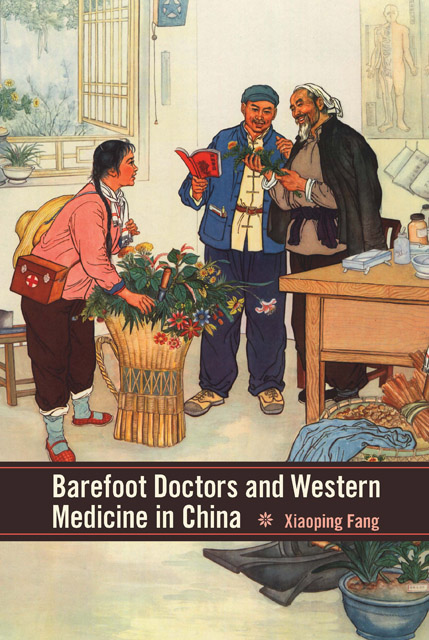Book contents
- Frontmatter
- Contents
- List of Illustrations
- Acknowledgments
- Maps
- Introduction
- 1 Village Healers, Medical Pluralism, and State Medicine
- 2 Revolutionizing Knowledge Transmission Structures
- 3 Pharmaceuticals Reach the Villages
- 4 Healing Styles and Medical Beliefs: The Consumption of Chinese and Western Medicines
- 5 Relocating Illness: The Shift from Home Bedside to Hospital Ward
- 6 Group Identity, Power Relationships, and Medical Legitimacy
- 7 Conclusion
- Appendix One The Organization of the Three-Tiered Medical System in Rural China, 1968–83
- Appendix Two Common Medicines in Chinese Villages during the 1960s–70s
- Abbreviations
- Glossary
- Notes
- Bibliography
- Index
2 - Revolutionizing Knowledge Transmission Structures
Published online by Cambridge University Press: 14 February 2023
- Frontmatter
- Contents
- List of Illustrations
- Acknowledgments
- Maps
- Introduction
- 1 Village Healers, Medical Pluralism, and State Medicine
- 2 Revolutionizing Knowledge Transmission Structures
- 3 Pharmaceuticals Reach the Villages
- 4 Healing Styles and Medical Beliefs: The Consumption of Chinese and Western Medicines
- 5 Relocating Illness: The Shift from Home Bedside to Hospital Ward
- 6 Group Identity, Power Relationships, and Medical Legitimacy
- 7 Conclusion
- Appendix One The Organization of the Three-Tiered Medical System in Rural China, 1968–83
- Appendix Two Common Medicines in Chinese Villages during the 1960s–70s
- Abbreviations
- Glossary
- Notes
- Bibliography
- Index
Summary
The healers who made up the plural Chinese medical world prior to 1949 followed long-standing traditions of knowledge transmission. These traditions were mainly either family based (parent-to-child transmission) or apprenticeship based (master-to-disciple transmission), and in both cases were confined to the local community. The personal nature of these transmission methods limited both the breadth of the dissemination of medical knowledge and the number of recipients of that knowledge. The People’s Republic of China’s newly established state medical system constantly reorganized existing plural medical systems, and the state sought to replace these traditional ways of acquiring medical knowledge to meet the demands of a modern, integrated national health program with more numerous medical personnel. The changes in the ways knowledge was transmitted were accompanied by the introduction of Western medicine into villages where Chinese herbal medicine had hitherto dominated, initially through Chinese medical practitioners and later through the barefoot doctors. This chapter contextualizes barefoot doctors at the confluence of Chinese and Western medicine and the new ways of transmitting medical knowledge, and it argues that the barefoot doctor program introduced Western medical knowledge into rural China at an unprecedented pace and therefore is responsible for the marginalization of Chinese medical knowledge.
Changing Ways of Knowing
In the social history of medicine in China up to the late imperial period, ways of transmitting medical knowledge are basically classified as either scholarly or nonscholarly. Scholarly transmission refers to the ways that the literati or Confucian physicians obtained medical knowledge. Traditionally, there were three kinds of scholarly transmission: studying under masters, training within families, clans, and lineages, and self-study. According to statistical data on physicians in Jiangsu, Zhejiang, and Anhui during the Ming dynasty, 101 healers obtained medical knowledge through self-study, 271 by studying under masters, and 769 through family training. This evidence indicates that the family played the greatest role in the study of medicine in traditional Chinese society. Family medical tradition was also a key criterion of proficiency, as reflected in the proverb “Do not take medicine from a physician who is not a third-generation practitioner” (yibu sanshi, bufu qiyao). As a result, physicians emphasized their pedigrees through real or invented medical genealogies. During the Ming and Qing dynasties, about 60 percent of practitioners with expertise in specific types or areas of healing came from families that had practiced medicine for at least two generations.
- Type
- Chapter
- Information
- Barefoot Doctors and Western Medicine in China , pp. 42 - 66Publisher: Boydell & BrewerPrint publication year: 2012



